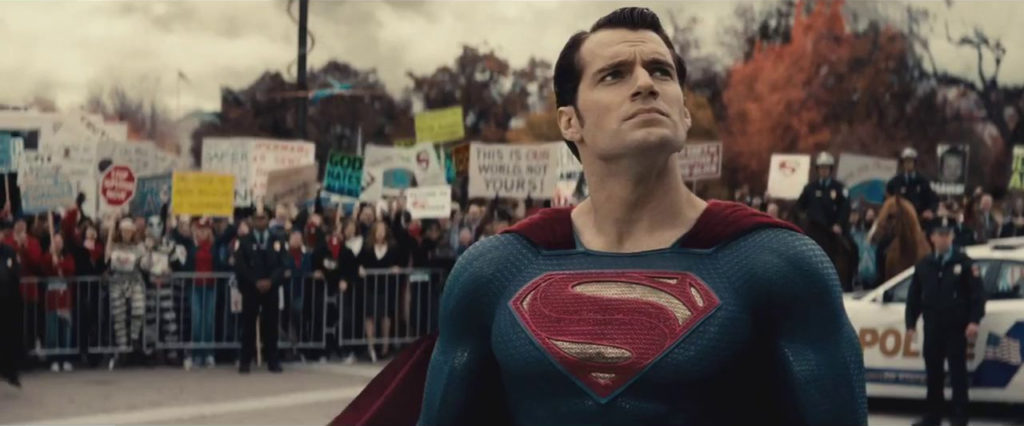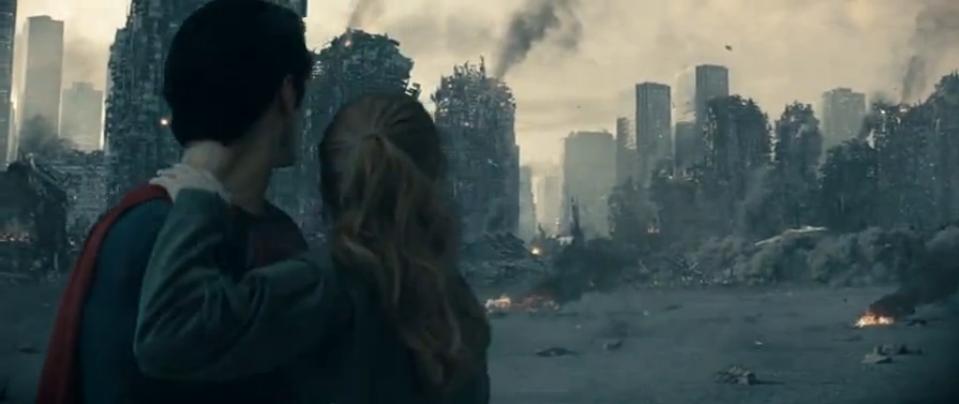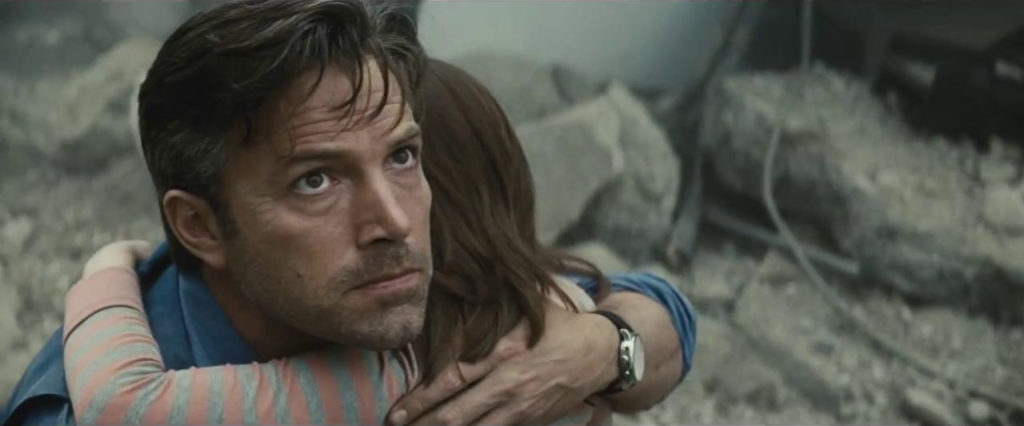Badfan v Superman 7: A Hero’s Consequences
See part 1, part 2, part 3, part 4, part 5, part 6, or read the the whole Badfan v Superman series so far.
Austin Gunderson: We want Superman to come and save us without even bloodying his hands. But it’s Man of Steel’s refusal to step outside reality that makes the film so moving and so very moral.
E. Stephen Burnett: Now as we draw to the end of this series, I’m remembering how I felt when I left the theater after seeing Man of Steel. I was not sure this was a film I “enjoyed.” Rather than feeling uplifted and entertained, I felt shell-shocked.1 Instead of thinking, “yay, Superman!” I was thinking, “Whoa … Superman …” I didn’t walk out with a smile as much as a shiver.

Fact: The Westboro “Baptist” “Church” also exists in the DC film universe.
Did that make the film bad? I wasn’t sure. Then I began reading the Man of Steel criticism.
People were lambasting the scenes of the super-destruction of Metropolis and Superman’s killing of General Zod. They were acting like the film was at fault for being so careless about the horrors. And yet … why? This may sound like a criticism, but no one felt the same after The Avengers either in-universe2 or among fans. No one has insisted on seeing consequences.
What was happening? Fans were criticizing the “desensitization” of Man of Steel when in fact that story was re-sensitizing them to the horror of actual cinematic city-destruction and death. And meanwhile, fans—who don’t know any better—were giving a pass to other onscreen superhero stories that arguably do treat citywide destruction and death as par for the course (it’s just a movie, folks!) and arguably do desensitize viewers.

The real-world criticism of Man of Steel may be a microcosm of how we also respond to real death and destruction. We don’t want to see real horror. It makes us uncomfortable—because then we might have to make hard choices, even compromises. We might be asked to condemn or even fight real horrors beyond the ones we’re familiar with. 3. Or we might find ourselves being shoved off the “high ground” we believe we own simply because it’s a safe distance from the real-world challenges. Or (here’s a tough one) we might find ourselves distracted from the “gritty” and “realistic” stories we make up to persuade ourselves that no, we actually are acquainted with all these horrible things, and we’re not like those other people who want a pre-sanitized reality in which they needn’t get their own hands dirty.
Like I said, it’s a microcosm. The analogy is not exact—especially when not even Man of Steel, which is rated PG-13 in the U.S., showed people jumping from those falling buildings or being pommeled by world-engine gravity pulses. But then again, with stories we can only get approximate simulations of reality. That’s the point of stories in the first place.
And this is exactly why I am thrilled that, by all indications, Batman v Superman: Dawn of Justice is even attempting to tackle the issue of serious super-consequences.
I wouldn’t have done it any other way. In fact, days after Man of Steel when I was still busy thinking about the story—usually a mark of a good story—I realized exactly what would make all that shell-shocking destruction worth it: Serious consequences in the sequel. It would prove that the super-knockdown had a goal—to re-sensitize audiences, get them thinking, get them asking questions, get them seriously engaging the story rather than just clapping.4
Then as we were writing this series, the second Batman v Superman trailer released and proved (so far) that my expectations were justified. “Today is a day for truth,” pronounces the character of a U.S. senator, portrayed by Holly “Elastigirl” Hunter. “Let the record show that this committee holds [Superman] responsible,” for the destruction of Metropolis.
To me it seems the trailer reveals that Superman, though surely tempted to embrace the “grimdark” hero and shy back from his own powers, persists in striving to become that symbol of hope that Jor-El, and his Earthly mother, have encouraged him to be.

But meanwhile Bruce Wayne is out there, having already been that grimdark hero, who has personally suffered the consequences of that citywide destruction. Wayne Enterprises employees perished in that attack and Bruce will surely feel that, as one anonymous note-writer accuses, “YOU LET YOUR FAMILY DIE.” Imagine that kind of burden, especially on a “retired” Bat-vigilante driven to crime-fight after a criminal killed his original family.
And when Batman is possibly encouraged by power players (such as Lex Luthor) with their own envy/villainy against Superman, we have here a reasonable and realistic basis for Batman to face off against Superman. It’s not just clashing egos, e.g. The Avengers, but more like what Man of Steel director and co. have promised: an honest clash of philosophies.
If, as Hunter in the first teaser somewhat predictably quotes, “absolute power [tends to] corrupt absolutely,” what happens to Superman? Does he have “absolute power”? Or does he have a weakness along with (or perhaps symbolized by) kryptonite? How will Superman fight to be that symbol of hope—e.g. to live up himself to the ideal of the Superman? What would persuade Batman that Superman is actually a true hero, when given the chance to become that ideal and not be feared as an alien? How would Wonder Woman and Aquaman and all the other heroes fit in? How would this lead to the titular Dawn of Justice [League]?
This superfan can’t wait. Let’s keep speculating below—and then, over to Austin for the conclusion of our month-long Badfan v Superman series!
Read Badfan v Superman 8: A Moral Cinematic Universe. Or see the entire Badfan v Superman series.
- This was partly due to the theater’s abnormal, ear-shattering sound level. No one else but my wife and me noticed, but I actually complained and the theater staff later told me that yes, the sound system had been wrongly configured in that particular theater. To this day I’m perplexed, and a little health-concerned, that no one else noticed. ↩
- Beyond a few stray references to the battle of New York in the Netflix Daredevil series. ↩
- Example: if we primarily talk about terrorist attacks we might need to confront racism, and if we only want to talk about racism we might need to confront terrorist attacks. ↩
- By the way, The Dark Knight (2008) also caused a similar serious audience engagement. Remember when Batman and Commissioner Gordon choose at the film’s end—to portray Batman as a criminal and save the reputation of the corrupted Harvey Dent—and critics (such as fantasy author Bryan Davis) insisted no true hero could do that?
Back then I insisted that yes, sometimes true heroes—even God-fearing Christians—might be pressed into such choices and we would be fools to pretend we can avoid them. (In one instance my comments were deleted—an incidental proof of my point that we do suspect some kind of tiny “evil” is necessary to keep things appearing safe and clean!) I also insisted that The Dark Knight story is not over and that there’s more to be said about the characters’ choice. Then The Dark Knight Rises released in 2012, and its story hinged on the fact that Batman and Gordon had built only a temporary “security” for Gotham City on this lie. No one talks about that controversy any more because The Dark Knight Rises explicitly showed the choice was flawed and consequential, though perhaps a “necessary evil” at the time. ↩





























Um, did you even watch The Avengers? A major component of Captain America’s battle plan is trying to keep the alien invaders to a few blocks as possible to avoid more damage and loss of life. In fact, many of the Marvel movies have this component of heroes protecting people as they defeat the villains, instead of just trying to defeat them at any cost and ignoring the surrounding damage and casualties. Off the top of my head I can think of scenes from Thor, Guardians of the Galaxy, and Avengers: Age of Ultron that illustrate this.
I’ve only been casually following your posts as Superman is one of my least favorite superheroes. I don’t know how justified the backlash against Man of Steel is because I have not see the movie. But I believe the reason other superhero movies, like The Avengers, have not had this same backlash, is because they have clearly shown the heroes trying to prevent destruction instead of causing it.
Just in case my meaning was unclear, I’m a huge The Avengers fan and a fan of the MCU as a whole. (Austin Gunderson, however, is less of a fan.)
I agree that the film — and Age of Ultron, more overtly — show the heroes trying to get civilians out of harm’s way. But my point was not “no one cared”; rather, I’m saying that if the issue is “buildings fell and people died, and that’s horrible,” then The Avengers did not follow through. The film ended only with everyone happy because the world was saved. But in fact, despite the heroes’ best efforts, you know thousands died in what later stories referred to as “the battle of New York.”
And that’s what war is — a sad, tragic thing in which people die.
Is a movie responsible for showing all the tragic consequences? Or should a movie be faulted for choosing only to emphasize the happy ending? I don’t believe so. (Austin may have a different view.) But what I am saying is that fans have been proving themselves inconsistent. Arguably Man of Steel shows a greater level of destruction and — while still being more pulpy as a super-action thriller — makes audiences feel the brutality of it. And the sequel promises to explore this even more, and will likely lead to this new-formed hero (with friends) finding far better ways to fight supervillainy and minimize civilian casualties in the future.
Remember: Captain America was a super-soldier. Without him, Iron Man, Thor and the rest may not have thought first to get the civilians out of harm’s way as best they can. Also remember: Superman was on his own and against a far superior force. Man of Steel didn’t offer a “fun” alien battle. It wasn’t ever meant to. But for me, that actually makes it “fun” in a different way — in a more-serious and more-challenging way. I do make room for both kinds of super-storytelling.
“buildings feel and people died, and that’s horrible” Buildings with the feels? I can’t help picturing buildings with tears dripping from blown out windows….
Oh, you.
(Fixes typo)
I think you probably would like X-Men: Days of Future Past better, Stephen. It did the themes you like, without it feeling forced. X-Men first Class, to a lesser degree.
Speculation:
Superman gets under luthor’s control, turns bad, batman gathers justice league to stop him. They have almost the entire league there, and unless they are there for cameos during the credits, they’d probably all fight superman at some point. Luthor gets revealed as the main baddie, they realize they all were wrong, and beat up him and whatever allies he gets/big heavy he uses.
Hoping it’s not going to be a mess.